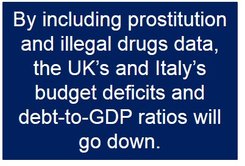Prostitution plus illegal drugs make up approximately 0.7% of the United Kingdom’s GDP, i.e. about £10 billion ($16.76 billion) each year. Illegal drugs are estimated to be worth £4.4 billion ($7.38 billion) and prostitution £5.3 billion ($8.88 billion), according to the Office for National Statistics (ONS).
Those were the figures calculated for 2009; they are likely to be worth more now.
The ONS says that prostitution and illegal drugs, which we also refer to as illicit drugs, will be included in GDP (gross domestic product) calculations after the European Union made some radical regulation changes. The smuggling of tobacco products and alcohol, which are worth about £300 million annually, are already included.
EU wants comparable data
The European Union’s aim is to make GDP figures meaningful and comparable. In Greece, Austria, Hungary and Germany, where prostitution is legal, such data is already included in their national accounts.
Other more prudish nations, such as the UK, have never included it. As for drugs, in the Netherlands some of them are decriminalized and have been included in GDP calculations for many years, while several other member states have refrained from doing this.
The ONS wrote in its bulletin “National Accounts: progress report on this year’s changes“:
“Inclusion in the National Accounts of certain illegal activities, such as prostitution and drug importation, manufacture and consumption; some of which are not prohibited in certain EU countries and for which comparable figures are now required. The new estimates would add approximately £10bn to the level of GDP in 2009.”
Twice as much as real estate
If these figures are accurate, prostitution plus illegal drugs make up a similar percentage of the national economy as do agriculture and gambling, more than advertising and twice as much as the real estate business.
The Telegraph quotes Graeme Walker, head of national accounts at ONS, who said:
“In terms of the new concepts coming in, illegal activities is the biggest. For the rest of GDP we do things like sending questionnaires to businesses, asking them how much they have earned. We don’t think it would be right to directly collect information on [illegal drugs and prostitution] and we have no plans to contact people involved in these activities.”
“We think our data fits the purpose for giving people an idea of the size of illegal activity.”
Dutch model used for estimates
The ONS calculated prostitution’s contribution to GDP by using a Dutch model, which includes the number of clients a sex worker has each week, how much they pay for each visit (average), and the cost of clothing, condoms and room rental.
Illegal drugs’ contribution was worked out using estimates of sales, street prices, imports, police seizures, purity, and user numbers. Six drugs will be included in the calculations: amphetamines, ecstasy, cannabis, heroin, powder cocaine and crack cocaine.
According to an initial ONS estimate, the contribution of prostitution plus illegal drugs to the national economy from 2007 to 2009 was between £7 billion and £11 billion.
When the ONS publishes the national accounts in September, it will include the provision of prostitution plus illegal drugs.

The ONS adds that as the availability of data is considerably limited, the calculations will be based on a range of sources and assumptions.
The ONS wrote (PDF):
“The estimates are based on data of variable quality, with the estimates of illegal drugs activity markedly stronger than those of prostitution, but both definitely weaker than the estimates of legal activity. Given this, a continuous process of improvement should be applied to these estimates to ensure that they are the best possible quality.”
Good news for Italy
Some of Italy’s shadow economy is already included in its GDP figures. It will now have to add black market tobacco and alcohol, illegal drugs and prostitution. Black market refers to the illegal trading of goods and services. The shadow economy, also known as the black economy, is part of the economy where all payments are cash-only; incomes are never declared and taxes are not paid.
According to Eurostat, the EU’s statistical agency, adding the new data could increase Italy’s GDP by as much as 2%. This would help bring the country’s budget deficit below the 3% required by Eurozone authorities. Its current debt-to-GDP ratio, which stood at 132.6% in December, would also decline.

